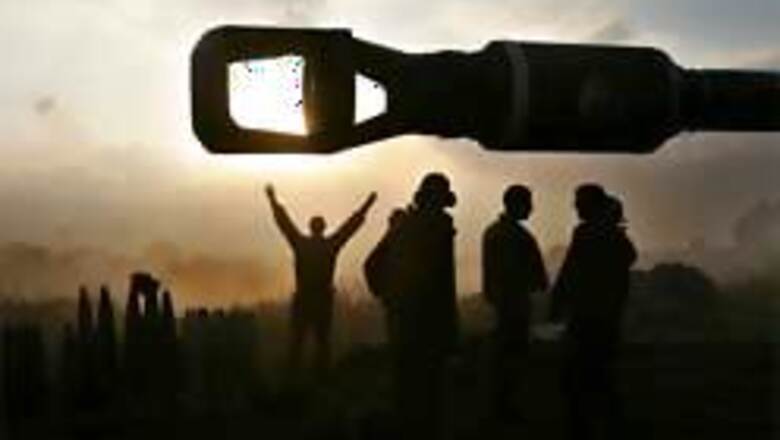
views
Jerusalem: The Israeli military said on early Wednesday it sent some troops into southern Lebanon searching for tunnels and weapons.
Israel declared on Tuesday it was ready to fight Hezbollah guerrillas for several more weeks, raising doubts about international efforts to broker an immediate cease-fire in the fighting that has killed more than 260 people and displaced 500,000.
Despite the diplomatic activity, Israel is in no hurry to end its offensive, which it sees as a unique opportunity to crush Hezbollah. The Islamic militants appear to have steadily built up their military strength after Israel pulled its troops out of southern Lebanon in 2000.
Israeli warplanes struck an army base outside Beirut and other areas in south Lebanon on Tuesday, killing 27 people, and Hezbollah rockets battered Israeli towns, killing one Israeli. Five big explosions reverberated over Beirut early Wednesday, and missiles hit towns to the east and south of the capital.
At daybreak Wednesday, a small number of Israeli troops were operating just across the border inside southern Lebanon, looking for tunnels and weapons, the Israeli military said. The military did not provide any more details and gave no indication that action would be expanded into a larger operation.
Israel's forecast of a lengthy campaign, coupled with President Bush's evident reluctance to bring pressure on Israel to agree to a cease-fire, seemed to quash any hopes for an early resolution of the crisis, now entering its second week.
Hundreds of Americans and Europeans fled Lebanon aboard ships, and hundreds of other foreigners prepared to evacuate in coming days. Many Americans complained over what they saw as a slow US response. And after criticism from Congress, the State Department dropped plans to ask Americans to pay for their evacuations on commercial vessels.
Families in southern Lebanon, the site of most Israeli airstrikes, drove north on side roads, winding among orange and banana groves and waving improvised white flags from their car windows.
In an interview with the BBC, Lebanese Prime Minister Fuad Saniora said Israel is ''opening the gates of hell and madness'' on his country. He urged Hezbollah, which is backed by Syria and Iran, to release two captured Israeli soldiers but said Israel's response had been disproportionate.
Israeli Prime Minister Ehud Olmert blamed Iran for sparking the clashes between Israel and Hezbollah, saying the country was trying to distract the world from the controversy over its nuclear program.
The offensive was sparked by the soldiers' capture July 12 but has now broadened into a campaign to neutralize Hezbollah.
Israel, which has mainly limited itself to attacks from the air and sea, had been reluctant to send in ground troops because Hezbollah is far more familiar with the terrain and because of memories of Israel's ill-fated 18-year-occupation of south Lebanon that ended in 2000.
But Maj Gen Moshe Kaplinsky said Israel had no intention of getting bogged down for a second time.

















Comments
0 comment